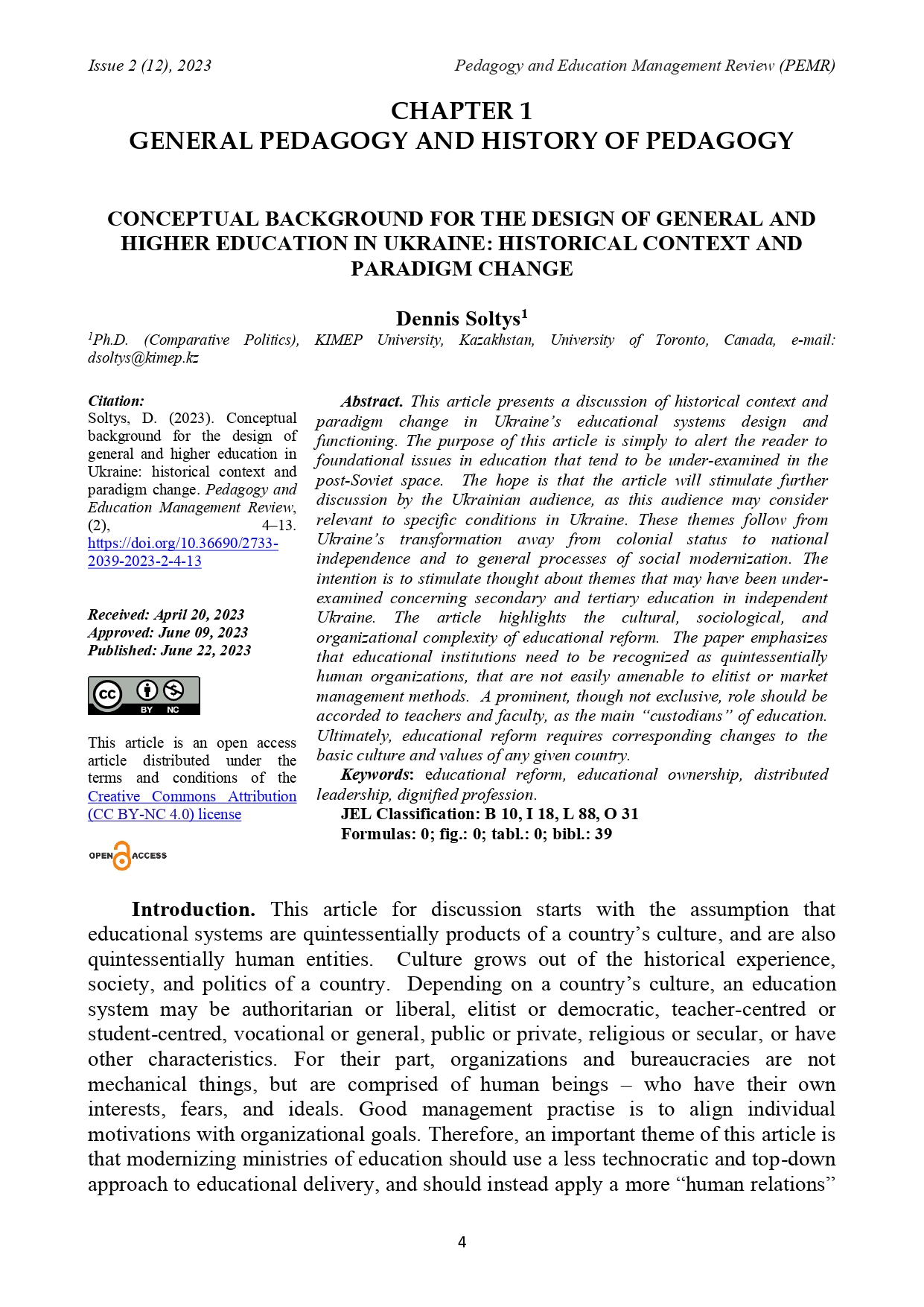CONCEPTUAL BACKGROUND FOR THE DESIGN OF GENERAL AND HIGHER EDUCATION IN UKRAINE: HISTORICAL CONTEXT AND PARADIGM CHANGE
DOI:
https://doi.org/10.36690/2733-2039-2023-2-4-13Keywords:
educational reform, educational ownership, distributed leadership, dignified professionAbstract
This article presents a discussion of historical context and paradigm change in Ukraine’s educational systems design and functioning. The purpose of this article is simply to alert the reader to foundational issues in education that tend to be under-examined in the post-Soviet space. The hope is that the article will stimulate further discussion by the Ukrainian audience, as this audience may consider relevant to specific conditions in Ukraine. These themes follow from Ukraine’s transformation away from colonial status to national independence and to general processes of social modernization. The intention is to stimulate thought about themes that may have been under-examined concerning secondary and tertiary education in independent Ukraine. The article highlights the cultural, sociological, and organizational complexity of educational reform. The paper emphasizes that educational institutions need to be recognized as quintessentially human organizations, that are not easily amenable to elitist or market management methods. A prominent, though not exclusive, role should be accorded to teachers and faculty, as the main “custodians” of education. Ultimately, educational reform requires corresponding changes to the basic culture and values of any given country.
Downloads
References
Fullan, M. 2017. The New Meaning of Educational Change. 4th Ed. New York. Teachers College Press.
Weber, M., 1905. The Protestant Ethic and the Spirit of Capitalism. London. George Allen and Unwin.
Moore, B., 1966. Social Origins of Dictatorship and Democracy. Boston, MA. Beacon Press.
Huntington, S., 1968. Political Order in Changing Societies. New Haven, CT. Yale University Press.
Fukuyama, F., 1995. “The Primacy of Culture.” Journal of Democracy. Vol. 6, No. 1.
North, D., 1990. Institutions, Institutional Change, and Economic Performance. New York. Cambridge University Press.
Sen. A., 1999. Development as Freedom. New York. Anchor Books.
Acemoglu, D. and Robinson, J., 2012. Why Nations Fail: The Origins of Power, Prosperity, and Poverty. New York. Currency.
DeWitt, N., 1961. Education and Professional Employment in the USSR. Washington. National Science Foundation.
Beissinger, M., 1988. Scientific Management, Socialist Discipline, and Soviet Power. Cambridge. Harvard University Press.
Jones, A., (1994). Education and Society in the New Russia. Armonk, NY. M.E. Sharpe.
Holmes, B., Read, G., Voskresenskaya, N., 1995. Russian Education: Tradition and Transition. New York and London. Garland Publishing.
Glazunova, N. 1987. Podgotovka rabochei smeny. Kiev. Vyshcha shkola.
Iagodin, G., 1990. “Cherez gumanizatsiiu i demokratiiu k novomu kachestvu obrazovaniia.” Vsesoiuznyi s’ezd rabotnikov narodnogo obrazovaniia: Stenograficheskii otchet. Moskva. Gosudarstvennyi komitet SSSR po narodnomu obrazovaniiu i Vysshaia shkola.
Dneprov, E., Lazareva, V., Sobkina, V., 1991. Rossiiskoe obrazovanie v perekhodnyi period: programma stabilizatsii i razvitia. Moskva: Ministerstvo obrazovaniia RSFSR.
Soltys, D., 1997. Education for Decline: Soviet Vocational and Technical Schooling from Khrushchev to Gorbachev. Toronto. University of Toronto Press.
DeWitt.
Hofstede, G., 2010. Culture’s Consequences: comparing values, behaviors, institutions, and organizations across nations. Thousand Oaks, CA. SAGE Publications.
Sowtis [Soltys], D., 1991. “Soviet Industrial Strategy and Reforms in Vocational Education, 1984-88: policy implications and implementation.” Comparative Education, Vol. 27, No. 1.
Soltys, 1997.
Clifford, G., 1975. The Shape of American Education. Englewood Cliffs. Prentice Hall.
Clifford.
Manzer, R., 1994. Public Schools and Political Ideas. Toronto. University of Toronto Press.
Gutmann, A., 1987. Democratic Education. Princeton. Princeton University Press.
Soltys, D., 2015. “Constructing quality education through quality citizenship: challenges for Ukraine between post-soviet and Bologna process bureaucratic elitism,” Economic Annals XXI, 55(11-12), 33-35.
Stehr, N., 2002. Knowledge and Economic Conduct: The Social Foundations of the Modern Economy. Toronto. University of Toronto Press.
Sen. A., 1999. Development as Freedom. New York. Anchor Books.
North.
Vouri, J., 2017. “Distributed leadership in the construction of a new higher education campus and community.” Education Management Administration & Leadership. August 24.
Connolly, M. and Fertig, J, 2017. “The difference between educational management and educational leadership and the importance of educational responsibility,” Education Management Administration & Leadership, December 20.
Yakavets, N., 2016. “Negotiating the principles and practice of school leadership – The Kazakhstan experience.” Education Management Administration & Leadership. April 18.
Plessius, H. and Ravesten, P., 2010. “The paradox of more flexibility in education: better control of educational activities as a prerequisite of more flexibility.” In N. Reynolds and M. Turcsany-Szabo, Eds. Key competencies in the knowledge society. IFIP Advances in Information and Communication Technology. New York. Springer. Vol. 324.
Harris-Van Keuren, C., 2011. “Influencing the status of teaching in Central Asia.” In I. Silova, Ed., Globalization on the margins: education and post-socialist transformations in Central Asia. Charlotte, NC. Information Age Publishing.
Peters, M., 2010. “Three Forms of the Knowledge Economy: Learning, Creativity and Openness.” British Journal of Educational Studies, Vol. 58, No. 3, 67-88.
Raza, R., 2009. Examining Autonomy and Accountability in Public and Private Tertiary Institutions. Washington. World Bank. Human Development Network.
Sen. A., 1999. Development as Freedom. New York. Anchor Books.
Soltys, D., 2015. “Similarities, divergence, and incapacity in the Bologna Process reform implementation by the former-socialist countries: the self-defeat of state regulations,” Comparative Education, Vol. 51, No. 2, 179-195.
Soltys, D. and Bizhanova, A., 2020. “The role of the educational community in developing Kazakhstan’s higher education sector: autonomy, self-organization and capacity to influence policy.” In N. Mouraviev and A. Kolouri, Eds. Sustainable development in Kazakhstan: Policy and governance challenges and opportunities. London. Palgrave Macmillan.
Soltys, D. 2020. “Can Western-Style University Management be Applied to Kazakhstan? A Participant-Observer Case Study of KIMEP University,” Central Asia Business Journal, Vol. 11, No. 2, 15-24.







